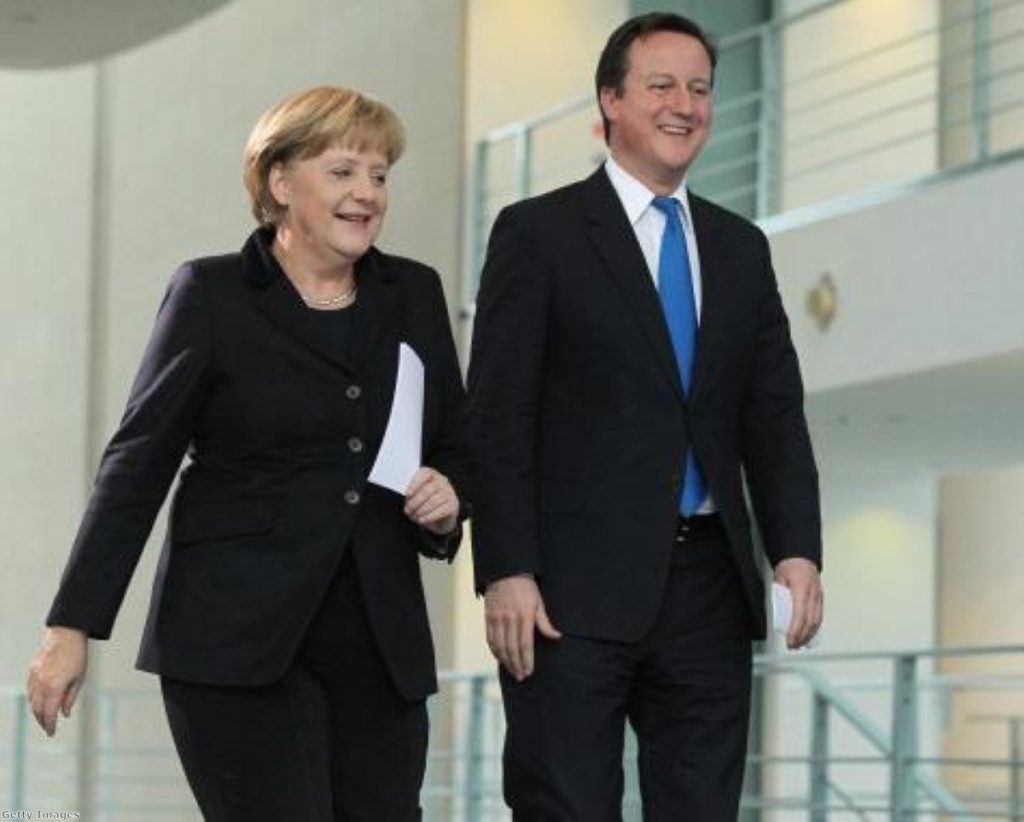Don’t be loners, Merkel tells Britain
Britain will find happiness elusive outside the European Union, Angela Merkel has warned the UK.
The German chancellor delivered her stark message in the European parliament after Ukip's Nigel Farage called for a "simple, amicable divorce" with the EU.
Merkel was tight-lipped in a joint press conference with David Cameron in Downing Street yesterday evening, as she emphasised the need to focus on "common ground" in talks with the UK prime minister.
She was much more direct in her earlier response to Farage, however, saying: "I believe you can be very happy on an island, but being alone in this world doesn't make you any happier."
Farage is not alone in calling for a British exit from the EU. At the weekend work and pensions secretary Iain Duncan Smith suggested the UK could "have it all" by continuing a trading relationship with European countries.
The Cabinet minister's comments are thought to have strengthened the resolve of backbench Conservative eurosceptics seeking an 'in-or-out' referendum sooner rather than later.
Marc Glendening, political director of the People's Pledge campaign seeking such a referendum, said Cameron's likely failure to achieve a real-terms freeze would only help his cause.
"That will only serve to intensify public opinion an EU-sceptical direction," he told politics.co.uk.
"Beyond that, it will create major problems for those within the Conservative party who are saying we can renegotiate the treaty with the EU and achieve some degree of decentralisation of power back to the member states.
"It will show that the majority of the EU state and the central European bureaucracy have no interest whatsoever in compromise and returning powers, and money in this case, to the member states."
Cameron and Merkel held "open and friendly" talks, No 10 has said, but agreement on this month's upcoming EU budget talks is thought to remain as elusive as ever.
The prime minister made clear that he believes the final deal, which will decide the spending between the 27 member states for the 2014-20 period, should be "at best a cut, at worst a freeze".
Cameron's hand has been forced into the open after his Commons defeat at the hands of Tory eurosceptics last week.
Merkel, by contrast, was able to keep her final position elusive. Germany is expected to call for a slight real-terms increase in the budget by arguing it should be brought into line with the equivalent of one per cent of the EU's GDP.
"Germany and the UK are both net contributors so there is a lot of interest that we share," she said.
"And we obviously also want to see to it that other European countries are drawn closer into the fold and member countries, neighbouring countries, are drawn closer into the fold, but we, all of us, obviously have to do something which will stand up in the court for public opinion back home."
She acknowledged that not all of the EU's spending "has been used with great efficiency" and underlined the need to continue talks "in the spirit of partnership and friendship in order to focus our interests".
Experts had warned beforehand that, while Cameron and Merkel enjoy friendly personal relations, they have struggled to convert their personal warmth into real diplomatic muscle in Europe's negotiating rooms.
Writing for politics.co.uk, Open Europe's senior research analyst Pawel Swidlicki argued there was "no way a new Anglo-German 'grand bargain' could have been expected to be reached overnight.
"It is important to remember that the two countries come at this issue from completely different perspectives – for the UK, in addition to practical budgetary considerations, the contribution to the EU budget carries great symbolic resonance, while in Germany it is seen as an unwelcome distraction given the wider problems within the eurozone," he wrote.
"Striking a deal on the EU budget will be very difficult – not for nothing did Tony Blair say it was harder to agree on than on peace in Northern Ireland."





-01.png)